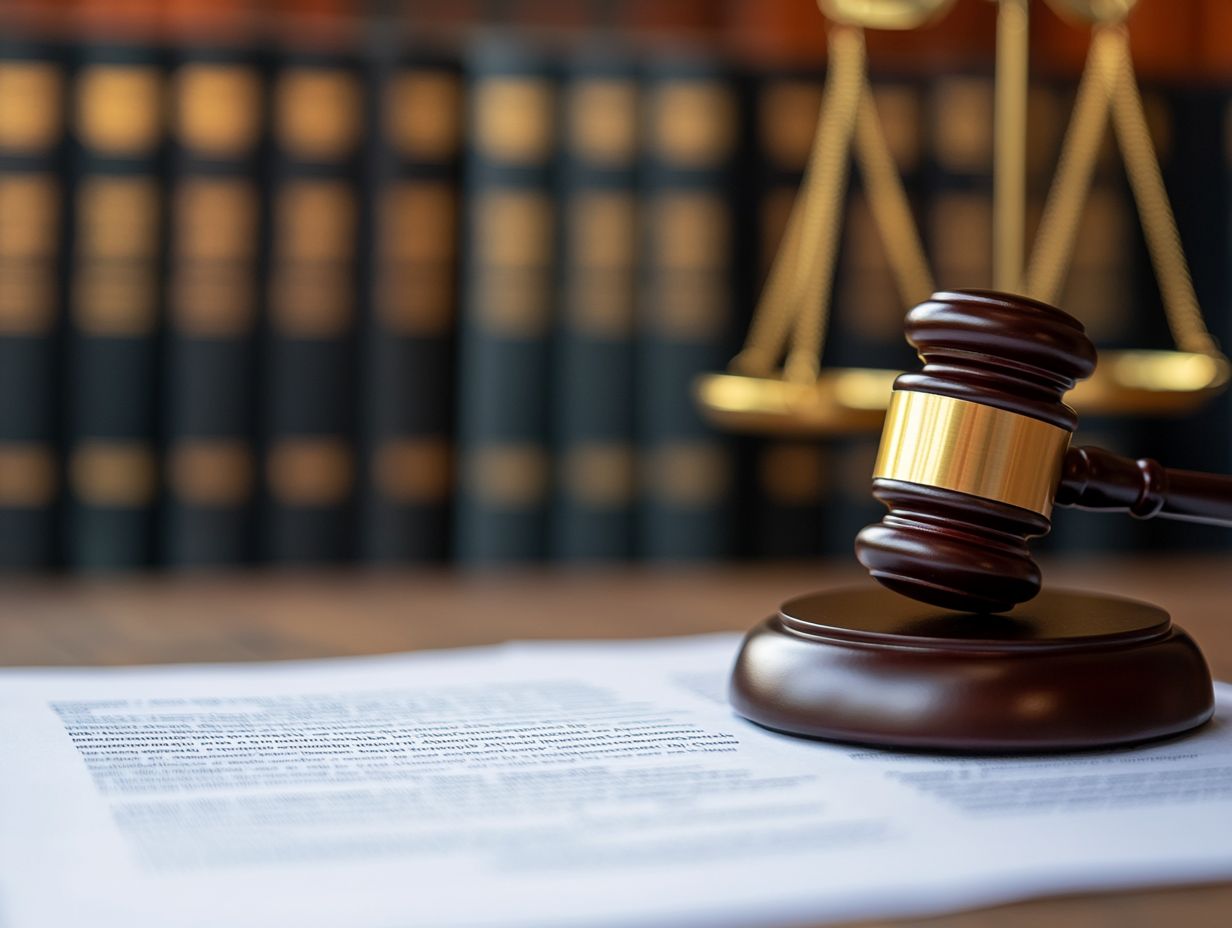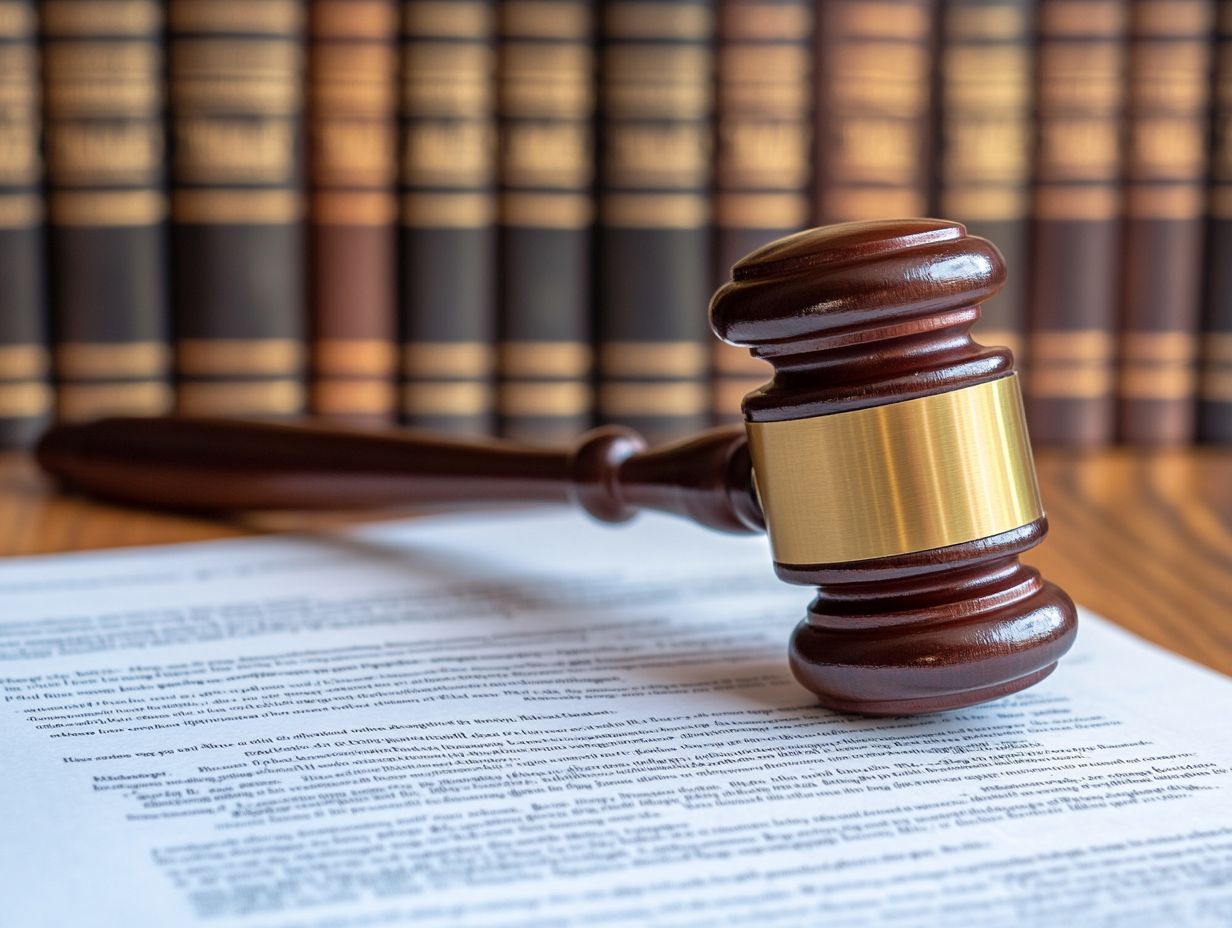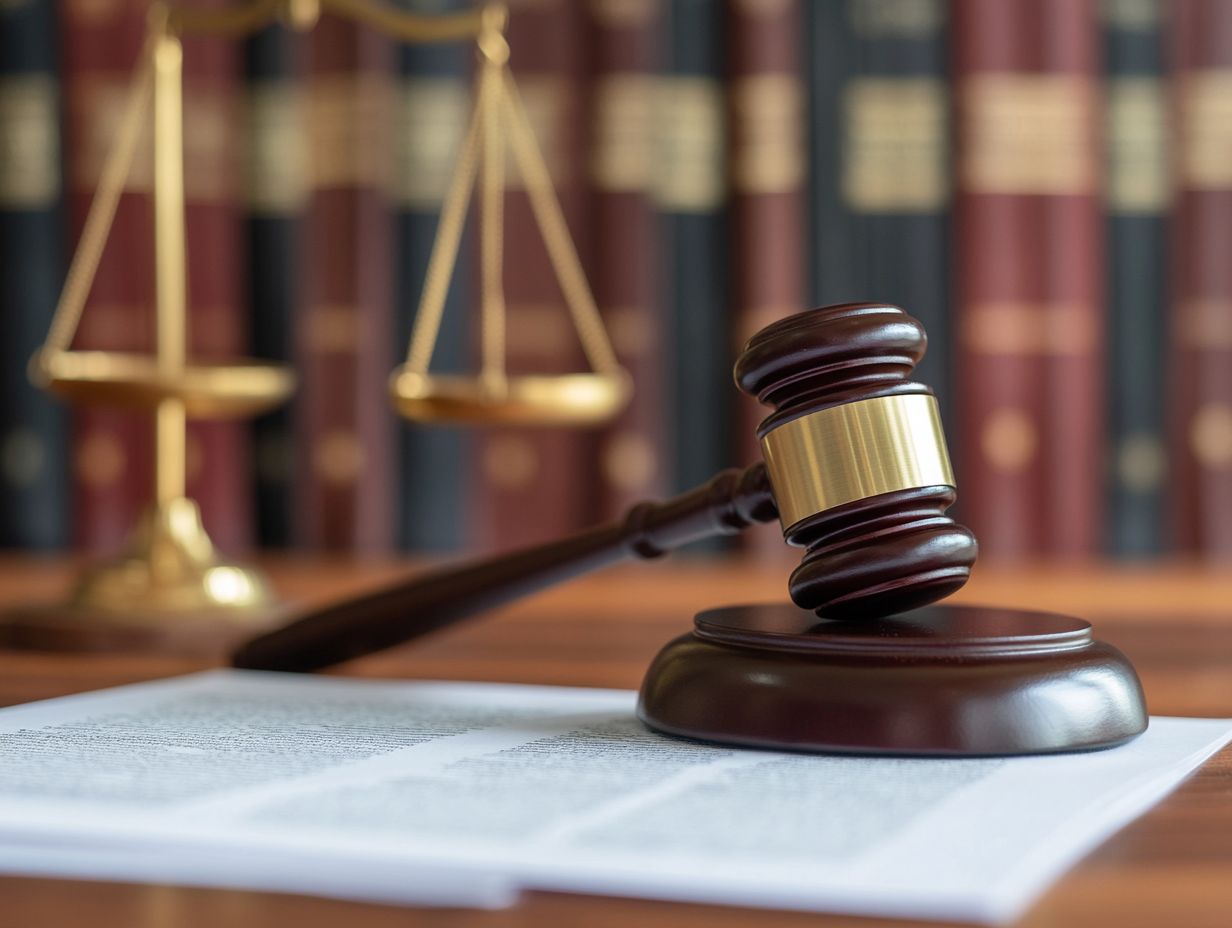Trade Secrets: Legal Definitions and Standards
Trade secrets are crucial in the competitive world of business. They protect valuable information that can give you a significant edge.
This article explains what qualifies as a trade secret, the legal protections you have, and the key elements that make information eligible for protection.
It also discusses the consequences of stealing these secrets and best practices for keeping them safe.
Contents
- Key Takeaways:
- Understanding Trade Secrets
- Legal Protections for Trade Secrets
- Elements of a Trade Secret
- Misappropriation of Trade Secrets
- Protecting Trade Secrets
- Enforcing Trade Secret Rights
- Frequently Asked Questions
- What is a trade secret?
- How are trade secrets protected legally?
- What are the legal standards for determining if something is a trade secret?
- What is the statute of limitations for trade secret misappropriation?
- Can trade secrets be disclosed in legal proceedings?
- What are the consequences for misappropriating trade secrets?
Key Takeaways:

- Trade secrets are valuable, confidential information that gives a company a competitive advantage.
- Laws exist to protect trade secrets. Companies should also use non-disclosure agreements and limit access to secure them.
- For information to qualify as a trade secret, it must be not widely known and provide economic value.
Understanding Trade Secrets
Understanding trade secrets is essential for any business that wants to safeguard valuable confidential information. This information must hold independent economic value and be protected by reasonable precautions.
Effective trade secret protection requires adherence to laws like the Uniform Trade Secrets Act and the Economic Espionage Act. These laws empower trade secret holders to secure their proprietary information from unauthorized use and unfair competition.
As you explore the world of intellectual property, understanding the legal landscape surrounding trade secrets is vital for maintaining your competitive advantage.
Legal Protections for Trade Secrets
Legal protections are crucial for safeguarding proprietary information from unauthorized use. The Uniform Trade Secrets Act and the Economic Espionage Act provide a solid foundation for this protection.
The Restatement of Torts also clarifies the definitions and implications surrounding trade secret claims. This offers a framework for taking legal action against breaches of confidentiality.
Knowing these laws empowers your business to stay ahead of the competition and effectively protect your confidential information.
Definition and Importance
Trade secrets are confidential pieces of information that hold significant economic value because they are not widely known. This definition explains why businesses prioritize protecting their proprietary insights; it is the foundation of competitive advantage and innovation.
For any organization aiming to thrive in a competitive market, understanding the importance of protecting trade secrets is essential. This information can include formulas, practices, designs, instruments, patterns, or any other invaluable insights kept confidential.
What makes trade secrets particularly valuable is their indefinite lifespan; as long as the information remains confidential, it can continually provide a competitive edge. Protecting this information is not just about maintaining market position it s also about fostering innovation.
If a business fails to implement reasonable measures to keep its trade secrets secure, it risks losing its competitive status. This can lead to significant economic consequences, such as loss of market share and diminished credibility.
Elements of a Trade Secret

The elements of a trade secret are crucial in determining whether specific information deserves legal protection against unauthorized use. Key components include the information’s independent economic value, reasonable measures taken to keep it secret, and the fact that it is not generally known to the public.
As a trade secret holder, you must demonstrate that you have implemented appropriate safeguards to protect your proprietary information. This is essential for navigating the legal landscape surrounding trade secret protection.
In conclusion, it is vital to implement best practices immediately to protect your trade secrets. Taking proactive steps to safeguard your confidential information can make a significant difference in your business’s success.
What Qualifies as a Trade Secret?
A trade secret includes confidential information that gives your organization an edge. This can be customer lists, formulas, or sensitive data not available to the public.
Understanding what qualifies as a trade secret is essential. A trade secret must have economic value, be confidential, and not easily discoverable by others.
To protect your trade secrets, you need strong security measures. This includes non-disclosure agreements and limiting access to sensitive information.
Misappropriation can lead to severe financial losses and damage your reputation. Stay vigilant to protect your vital information.
Misappropriation of Trade Secrets
Misappropriation occurs when confidential information is obtained improperly. This leads to unfair competition and risks for those who hold these secrets.
The law provides ways to protect trade secrets. This allows holders to seek help if someone misuses their information.
Organizations must understand misappropriation to protect their secrets in a competitive market.
Actions and Consequences
Actions leading to misappropriation can include corporate spying or simple negligence. The consequences can be severe for individuals or organizations.
Legal remedies for misappropriation can include financial compensation and, in some cases, criminal penalties. Understanding these consequences is vital for protecting your business.
Employees might accidentally share sensitive information or third parties could exploit security gaps. These issues often arise from poor training or inadequate safeguards.
During disputes, you can pursue legal action to recover damages and stop unlawful actions. Courts may also order the return of stolen materials.
Implementing strong protections, like confidentiality agreements and strict access controls, helps you maintain your market advantage.
Protecting Trade Secrets

Safeguarding your trade secrets requires best practices and reasonable measures. This is crucial to maintain your competitive edge.
Adopt a strategy that includes legal protections, employee training, and confidentiality agreements to secure your trade secrets.
Understanding and applying these protection methods is essential for any business that wants to keep its valuable information safe.
Best Practices for Keeping Secrets Safe
Implementing best practices to safeguard your trade secrets requires thoughtful precautions and strong confidentiality measures within your organization. This means restricting access to sensitive information and utilizing non-disclosure agreements.
Additionally, cultivating a culture that prioritizes information security is crucial. By adopting these practices, you can significantly reduce the risk of misappropriation and enhance your trade secret protection efforts.
To further bolster confidentiality, consider implementing robust access controls that limit sensitive information to only those employees who need it for their roles. Regular training programs focused on the importance of safeguarding sensitive information can help cultivate a vigilant workforce.
Using legal instruments like intellectual property rights provides extra protection against unauthorized disclosures. By integrating these strategies, you create a secure environment while reinforcing the value of trade secrets as vital assets that drive your competitive edge.
Enforcing Trade Secret Rights
Enforcing trade secret rights is vital for you as a trade secret holder. It allows you to protect your sensitive information from misappropriation. This process involves a range of legal remedies tailored to address any infringements you might encounter.
When you make a trade secret claim, you can seek injunctive relief, monetary damages, and even attorney fees to recover losses resulting from the unauthorized use or disclosure of your confidential information.
Understanding the enforcement mechanisms at your disposal is essential for asserting your rights confidently and effectively.
Legal Remedies and Strategies
Legal remedies for enforcing your trade secret rights can include injunctive relief to stop any further dissemination of misappropriated information, alongside monetary damages to compensate for your losses.
When pursuing a trade secret claim, meticulously document your protective measures and clearly demonstrate the economic value of your confidential information. This will significantly strengthen your legal position. Adopting a proactive legal strategy is crucial for effectively protecting your trade secrets.
This approach not only safeguards your sensitive data but also enhances your chances of achieving a successful legal outcome. If you’re exploring trade secret enforcement, consider employing tactics like cease-and-desist letters and seeking court orders to solidify your case.
Meeting evidentiary requirements often requiring clear proof of your confidentiality measures can greatly influence a court s decision. Additionally, implementing robust internal policies related to information handling can serve as a cornerstone for your legal defenses and claims, reinforcing the integrity of your trade secret enforcement efforts.
Frequently Asked Questions

What is a trade secret?
A trade secret is a type of intellectual property that refers to confidential information used in a business to provide a competitive advantage. This information can include formulas, processes, strategies, and other valuable knowledge not known to the public.
How are trade secrets protected legally?
Trade secrets are protected through various laws and regulations, including the Uniform Trade Secrets Act (UTSA), adopted by most states. Companies can also protect their trade secrets through non-disclosure agreements (NDAs) and other contracts with employees, contractors, and other parties.
What are the legal standards for determining if something is a trade secret?
Trade secrets must meet specific criteria to be legally recognized: they must have economic value, be confidential, and the owner must have taken reasonable measures to keep them secret. For a deeper insight into these criteria, including issues surrounding understanding trade secret infringement, the information also cannot be readily available to the public or easily reverse-engineered.
What is the statute of limitations for trade secret misappropriation?
The statute of limitations for trade secret misappropriation varies by state, typically ranging from two to five years. It is important to act quickly if you believe your trade secrets have been stolen or disclosed, as the time limit to file a claim may vary.
Can trade secrets be disclosed in legal proceedings?
Sometimes, trade secrets must be disclosed in legal proceedings. This can happen during discovery, a time when both sides share relevant information, or in a court hearing.
The trade secret owner can request confidentiality. They may even seek protective orders to stop the information from being disclosed.
What are the consequences for misappropriating trade secrets?
Misappropriating trade secrets can lead to serious consequences. These include civil lawsuits, injunctions to stop further use, and even criminal charges.
The severity of the penalties varies by case. However, offenders can face significant financial and reputational damage.






